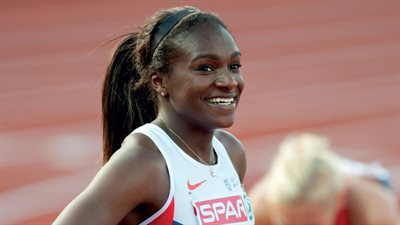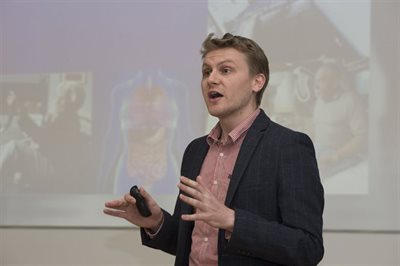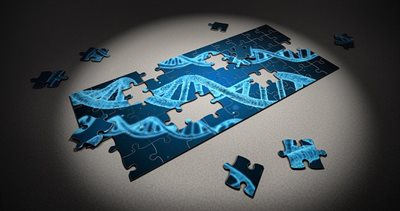Can anyone become an elite athlete?
Last weekend King’s alumna, Dina Asher-Smith (History 2017) won three gold medals at the 2018 European Championship winning the 100m, 200m and 4x100m relay.

Dina ran the 100m in 10.85 seconds, achieving the joint fastest time in the world for 2018. Not only was Dina the first woman to run the 200m in under 22 seconds in 2018, she also became the first woman in almost thirty years to secure a sprint treble at a major championship.
Elite athletes represent the peak of human physical performance. But what makes these individuals different from the rest of us and is it even possible for us to reach their level?

Dr Richard Bruce, Programme lead for the BSc in Sport & Exercise Medical Science at King’s, and researcher in the Centre for Human & Applied Physiological Sciences reveals all…
By the very definition not everyone can become an elite athlete, however there are certain genetic, physical and psychological characteristics that many top performers seem to have in common.
Genetics
Our current understanding is that your basic genetic make-up is at least partly responsible for how well you can perform athletically. Some people do seem to be born with the genetics to make them more likely to perform better at endurance sports and others might be predisposed to being sprinters or ‘power’ athletes. Growing scientific evidence, often based on studies focused on similarities and differences within families including between twins, suggest that genetic factors could underlie up to 66 percent of the differences among individuals in traits related to athletic performance.
One such gene is ACTN3 which partly influences the performance of fast-twitch muscle fibres in the human body. One variation of the gene in the human population, known as 577R, is found at a higher frequency in populations of male and female sprinters. This variation generates fast and forceful contractions of skeletal muscle, enabling high power – a key to high level sprint performance. Interestingly, this variation is also found at lower frequencies in endurance athletes, who tend to have the 577X variation, which reinforces the relationship between this gene and athletic ability.
Physical training
While your genetic make-up may be important it is certainly not a guarantee of success, and no athlete can perform at the elite level without considerable amounts of training and practice.
Perhaps the most obviously adaptable trait through physical training is muscle size. Repeatedly lifting heavy weights with a group of muscles will result in those muscles becoming larger and stronger, and eventually with the ability to lift heavier weight. The heart is also made of muscle (cardiomyocytes) and is equally adaptable. For example, endurance training places a significant load on the heart and it can change by increasing the size and wall-thickness of its left ventricle, allowing more blood to be delivered to our exercising muscles.
However, perhaps the two most important principles of training are specificity and reversibility. The adaptations that occur to the body are specific to the type of training you do. If you want to improve your marathon, time lifting weights will no help to you, and interestingly the performance of other ‘endurance’ sports such as cycling will still not be anywhere near as beneficial as actual running. In addition, if you stop training all the beneficial adaptations will eventually reverse back to their pre-training state. So, one of the keys to being and elite athlete is a carefully selected and personalised training programme and, if you’re lucky enough to remain injury free, to maintain that training for significant lengths of time.
Mental strength and perseverance
To participate in sport, and succeed, at an elite level, an athlete needs to make a huge commitment physically, but also, mentally. The perseverance to train and perfect a skill requires deliberate practice over and over. This, on top of the ability to perform at your very best on all occasions despite the pressure from teammates, coaches, the media, and supporters is often described as ‘mental toughness’.
A golfer can practice a three-foot putt every day hundreds of times, but it takes a huge amount of mental control and focus to make the same putt in front of thousands of people when a major championship title is on the line. The difference between sinking the putt on this occasion compared to every other time comes down to mental strength and self-belief.
Can anyone become an elite athlete?

Successful elite athletes, such as King’s alumna, multiple gold medal winning Dina Asha-Smith, inevitably have natural talent and will likely have an underlying genetic predisposition for high level physical performance. However, success also demands countless hours of exercise training and specific interventions aimed at maximising performance.
Sport at King’s
King’s Sport Performance Athletes
King's is proud to offer support to our students who compete at the highest level while studying at King's.
Visit the King's Sport pages to find out how King's is helping to develop talented athletes through the King's Sport Performance Athlete programme.
Study Sport and Exercise Medical Sciences at King’s
King’s has launched a new BSc in Sports and Exercise Sciences which will provide scientific foundations of human performance and exercise, alongside an in-depth understanding of the mechanisms, treatment and prevention of disease.
Of this course, Richard says: “Our aim is to integrate basic and medical sciences teaching to raise the bar over traditional sport science courses, and by doing so, to develop scientists who can specialise in a range of disciplines”
The Centre for Human & Physiological Sciences
The Centre for Human & Physiological Sciences at King’s is focused on the functioning of the human body, its ability to respond and adapt to change to the myriad of challenges it may face throughout life.
Professor Stephen Harridge, Head of the Centre commented on becoming an elite athlete: “It is clear that that there is a large genetic component to having certain athletic abilities, but the training requirements needed to optimise different types of performance are of great interest to exercise scientists. At the other end of the spectrum in non-elite athletes, exercise is key to health throughout the life course. Finding ways in which we can increase level of physical activity in the general population is an important public health goal”.
The Centre recently published their findings that a lifetime of regular exercise slows down ageing.